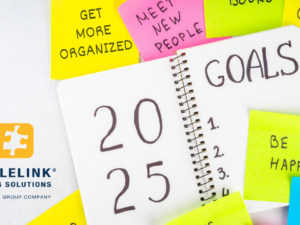
Working folks spend more time with their colleagues than anyone else in their lives. The average person spends nearly 90,000 hours at work. That’s nearly a decade of your life! Compare that to the time spent socializing with friends and family, which averages around only 368 days in a lifetime.
Ok, now that we’ve been a real Debbie Downer, know that we are only telling you this to inspire you to make the most of your coworker relationships because they are such a big part of your overall life experience.
Put simply: Getting along with coworkers—or at least developing respectful and mostly positive working relationships with them—can make your life a whole lot more enjoyable. And you deserve to enjoy it!
Along with improved job satisfaction, other important benefits of building positive relationships with your colleagues can also boost your health and well-being, reduce work-related stress levels, and offer a sense of community and camaraderie that you just cannot find elsewhere.
Nobody wants to spend a decade of their lives with people they cannot stand. That said, learning how to get along with your coworkers is a skill that takes practice, just like any other skills required of you in your role.
Whether you are preparing to start your first job or want to improve the relationships you do (or don’t) have with your colleagues, here are five tips for how to get along with others in the workplace.
Tip #1: Check Your Ego at the Door
Have you ever encountered someone in the workplace who always believes they are right, never admits mistakes, or dismisses others’ ideas without a second thought? That is the ego at play, and it is a major obstacle to harmonious coworker relationships.
Unchecked egos can create an unhealthy atmosphere at work because of the resulting risks to teams, such as creating silos, echo chambers, discrimination, bullying, and inequality. Egotism in the workplace can also:
- Ruin company culture by destroying morale according to Monster which found that most employees (76%) have suffered the effects of a toxic boss, with the most off-putting traits cited as being power-hungry (26%), being a micromanager (18%), and being incompetent (17%).
- Create tension within the team by hindering workplace civility and slowing productive communication and collaboration.
- Discourage strong and trusting relationships since people are naturally less inclined to trust leaders and colleagues who are overly self-focused.
Here is a little bit of helpful myth-busting: Many people think someone with a “huge ego” is just overly confident or arrogant. But we all have an ego. It is just another word for our identity and the things about us that we think make us worthy. But, when we strongly identify with things like always being right, always being perfect, or always being the best at everything, it can unintentionally create a lot of distance between us and everyone around us. And it is usually a front for our own feeling that we are not enough.
The good news is that, just like Mr. Rogers teaches us, you are enough and we like you exactly as you are!
How to Not Let Ego Get in the Way at Work
The antidote to ego-driven conflicts is humility and self-awareness. We are all human, and as humans, we have biases, limitations, and we make mistakes. The key is to recognize these truths and accept that nobody is perfect.
Building rapport with your coworkers on a personal level before a professional one can be highly beneficial. By understanding their personalities, backgrounds, life stories, strengths, and motivations, you gain insights that can help you know where they are coming from and work more effectively (and joyfully) together.
Work is also more enjoyable when you can learn to acknowledge and value the contributions of your coworkers. Everyone brings something unique to the table, whether it is their experiences, ideas, or perspectives. And if you limit your relationships in business to people who are just like you, your opportunity for growth will be severely limited.
Healthy conflict can lead to constructive discussions, meaningful learning experiences, and innovative solutions. The key lies in maintaining a nonjudgmental and non-defensive attitude. Letting go of the need to win every argument allows for more open and productive discussions, and ultimately, a more positive company culture for all.
Consider this Simon Sinek quote, which should resonate whether you are a people leader or an individual contributor: “Great leaders share the credit when things go well and take responsibility when things go badly.”
Tip #2: Make Others Feel Better After Every Interaction
Positive interactions in the workplace can have a significant impact on team morale. When you create an environment where coworkers feel respected, appreciated, and valued, you’re not only boosting their spirits but also fostering a more cohesive and motivated team.
While it may feel good in the moment to complain about your manager or another coworker, this can discourage others from wanting to communicate with you. Avoiding gossip and overly negative conversation can positively affect your office relationships and how you feel about your job and workplace.
Knowing when and how to offer support to colleagues at work can be a challenge, but helping others encourages a work environment where people want to be, stay, and grow.
Here are three tips for helping and supporting your colleagues:
Three Simple Ways to Encourage and Support Your Coworkers
- Check in Often: Establishing regular check-ins is the foundation of any successful relationship, including your connections with coworkers. Make a point to say hello to your colleagues when you see them, practice active listening when you are in conversation (that means no email or Slack distractions!), and always be respectful of their boundaries. For example, if they mention having a ton of work, give them the space to get their work done.
- Offer Your Help or Support: If you notice a colleague needs help or has a large workload, offer to help them complete some tasks. Sometimes offering moral support is enough if you do not have time or can’t help with their work tasks. For example, if a colleague handles client interactions, but company policy restricts you from doing the same, you can still show support by bringing them a coffee while they make calls and telling them how much you admire how they show up and dig in, day after day.
- Express Appreciation and Gratitude: Taking a moment to express your appreciation and gratitude can go a long way. A simple “thank you” or a note of gratitude for a job well done can brighten someone’s day and strengthen your working relationships. We all want to know that the thousands of hours we invest in work are making a positive difference to someone. So be that someone for someone else and watch how their whole being lights up, simply because you took the time to say, “I appreciate you.”
Tip #3: Listen Twice as Much as You Speak
Effective communication in the workplace is less about what you say and more about what you can glean from others. And there’s certainly a difference between listening to respond and actively listening to understand.
Active listening is more than appearing to pay attention to someone’s words and comprehending them on the surface. It means fully attuning to the feelings and views of the speaker, comprehending non-verbal and energetic cues, and demonstrating unbiased acceptance and validation of their experience.
Attentive listening is not just about being polite—it has tangible benefits for coworker relationships. When you actively listen to your colleagues, they feel valued and heard. This sense of being understood rather than judged or shut down by your immediate response, which often comes before you have given yourself time to read between the lines and process the deeper meaning of their message, fosters trust, encourages more open communication, and promotes collaboration.
For instance, if a coworker shares an innovative idea, actively listening allows you to grasp the full scope of their vision. Your thoughtful feedback and acknowledgment can propel the idea forward to create a more productive and collaborative work environment and better work.
So, the next time you are in a conversation at work, remember the power of listening twice as much as you speak. It is a small shift that can yield significant improvements in your coworker relationships.
How to Cultivate Your Active Listening Skills
- Practice Empathy and Understanding: Empathy is the ability to use your imagination to understand how someone else might feel—and it is a fundamental component of active listening. When a coworker approaches you with a concern or an idea, strive to see things from their perspective. Ask yourself how they might be feeling, what challenges they might be facing, and what their goals and aspirations are. This empathetic approach demonstrates your willingness to understand while opening the door to more meaningful connections. Consider the phrase, “I can see how you would feel that way, it’s totally valid.”
- Avoid Interrupting, Dominating Conversations, or Disagreeing for Sport: Ever been in a conversation where someone continually interrupts or dominates the discussion? It’s frustrating, right? To foster better coworker relationships, be conscious of your conversational habits. Allow your colleagues to express themselves fully before responding. Give them the space to voice their thoughts, ideas, and concerns without interruptions. This shows respect for their viewpoints and encourages open dialogue. Further, be aware of your communication style too-often centers on disagreement. Know that everyone’s ideas and observations are valid, even if you don’t immediately understand the value they’re proposing. A straightforward way to avoid disagreement as a too-frequent rhetorical model is to try “and” instead of “but.” For example, instead of “I hear you, but I think we should do that,” try, “I hear what you’re saying, and I have some additional considerations I’d appreciate your take on.”
- Ask Follow-Up Questions: Asking thoughtful questions is another way to show you’re invested in a conversation. When thinking of what to ask, reflect on what the speaker just said so you’re only seeking new information. Try to think of questions that help them elaborate on what they just shared. Both specific and open-ended questions are a helpful way to get more information from the speaker. They may appreciate your questions if they forget to mention a specific point. A question format is also a great way to assert your opinion without shutting others down. For example, instead of “I don’t think that’s realistic,” try, “I hear you, and it makes me wonder: Do we think this is realistic?”
Tip #4: Be Open to Feedback
Receiving feedback can be a humbling experience, and still, it is an integral part of personal and professional growth. When you open yourself up to feedback, you’re essentially creating a pathway for improvement. This willingness to accept feedback helps you develop as an individual and nurtures better coworker relationships.
Feedback is like a mirror—it reflects aspects of yourself that you might not see clearly. Whether it’s constructive critique or praise, feedback offers valuable insights into your performance, behavior, and impact on others. It is an opportunity for self-reflection, professional and personal growth, and leveling up in your role.
How to Create a Feedback-Friendly Relationship with Your Coworkers
Building a feedback-friendly work environment is a two-way street. It involves not only being open to receiving feedback but also encouraging honest and constructive feedback from your coworkers about yourself.
Let your colleagues know that you value their opinions and perspectives. Encourage them to share feedback openly, whether it is related to a specific project, a team dynamic, or your personal interactions. Honest feedback, even if it’s critical, can help you identify areas where you can make positive changes.
And when you do receive feedback, approach it with an open mind. Avoid becoming defensive or dismissive. Instead, consider the feedback carefully and ask for clarification if needed. Reflect on how you can apply this feedback to enhance your performance or relationships. The ability to accept criticism gracefully demonstrates your commitment to personal growth and your respect for your coworkers’ input.
Incorporating feedback with your daily routine is a sure way to build stronger coworker relationships. It fosters a culture of continuous improvement, mutual respect, and trust, and makes the workplace a more positive and productive environment for everyone involved.
That said, you should also feel empowered to “filter” feedback that is unhelpful or comes from someone who isn’t holding up their end of the deal by being unreliable or otherwise incompetent in their role. Beware of coworkers who project their struggles and shortcomings onto you in critical feedback. Sometimes when we shine, it makes others feel uncomfortable. So, don’t get angry or take it too personally. Just pour on the empathy, take to heart what is valid, and let go of the rest. And then, get right back to being your awesome self!
Find Your Work People with Peoplelink Staffing
Knowing how to get along with your coworkers is crucial, but sometimes, a change of scenery is what you need to get a fresh start. Looking to make a career move? Find out how Peoplelink Staffing can help find the right fit for you.




